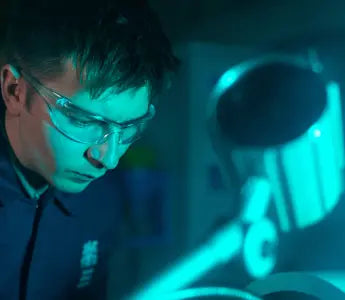
Industrial gas generators provide invaluable assistance within a number of industries. When you rely on a gas generator to keep your business running smoothly, you need your equipment to perform its best. But keeping a generator in proper working condition is not as simple as you may think. Monitoring your generator and scheduling proper maintenance is vital to support its complex functionality. At some point, it may be more efficient to replace your generator than to continue to fix it.
So, how can you know if you need to look for new equipment? Luckily, we've put together this guide to help you determine when to replace your generator.
Table of Contents:
- Types of Industrial Gas Generators
- Industries and Applications
- What Is a Gas Generator's Life Expectancy?
- Seven Signs You Should Replace Your Gas Generator
- The Importance of Gas Generator Maintenance
- Choosing a New Generator
Types of Industrial Gas Generators
Gas generators fall into two categories: pressure swing adsorption generators and membrane nitrogen generators:
Pressure Swing Adsorption Generators
Pressure swing adsorption (PSA) generators use absorptive materials to isolate either nitrogen or oxygen from other gases. With PSA generators, pressure levels are constantly swinging between high and low pressure. When contents are placed under high pressure, gas is "adsorbed." More gas is adsorbed as pressure is increased. As pressure reduces, gas is released, or "desorbed." With PSA generators, you can secure up to 99.999 percent nitrogen and 95 percent oxygen in your gas. These generators are typically more eco-friendly than their counterparts and relatively affordable.
Membrane Nitrogen Generators
Membrane generators work by exerting pressure to force compressed air into a tube that is surrounded by a bundle of membrane fibers. These membrane fibers separate the nitrogen from other gases, including oxygen. With membrane nitrogen generators, you can control the purity levels of your nitrogen by either increasing or decreasing the nitrogen flow amount, or filtering the gas through multiple different membrane fiber bundles. Membrane nitrogen generators also lack moving parts, which means they are less likely to need servicing or replacement. They also hold up well in difficult conditions.
Industries and Applications
PSA and membrane nitrogen generators are ideal for several types of manufacturing applications, including:- Food packaging, processing and preservation
- Chemical and petrochemical safety and pressure testing
- Packaging and safety of pharmaceuticals
- Industrial painting and cleaning projects
- Fire prevention and treatment
- Filling aircraft and automotive tires
- Product engineering and testing
What Is a Gas Generator's Life Expectancy?
Industrial gas generators are designed to have a long life expectancy with thousands of operational hours. The exact generator lifespan depends on the following factors:- The type of gas generator you have.
- Whether you purchased your generator in new or used condition.
- The environment in which your generator operates.
- The quality of the air filtered through your gas generator.
- How often you schedule routine and preventative maintenance.
- The frequency of required repairs and reoccurring issues.
The older your industrial gas generator gets, the less reliable it will become. As a generator reaches the end of its life, you may notice you are scheduling repairs more frequently as issues arise.

Seven Signs You Should Replace Your Gas Generator
Is your gas generator reaching the end of its life? Here are seven signs it may be time to replace it:
1. Your Generator Is Old
If your generator is several decades old or the purchase date is unknown and it is showing visible signs of age, it may be time to consider a replacement. Like any piece of machinery, generators slowly break down after decades of continuous use. This is especially true if your gas generator has not been routinely inspected and frequently malfunctions.
2. You've Had to Schedule Frequent Repairs
How many times have you had your generator serviced due to an issue or malfunction in recent years? Reoccurring problems are often a sign that the internal systems and mechanisms are breaking down. This can either happen as a result of age or improper care. When in doubt, ask your generator service technician if they believe a new system would be safer or less costly than the frequent repairs.
3. Your Generator Is Not Working Efficiently
An inefficient generator is more than an inconvenience — it can also be a financial drain and a safety hazard. Inefficient performance includes a generator that is increasingly slow to start or a machine that experiences frequent kicking and restarts. The quality of your produced nitrogen and oxygen is also a good determinant of the health of your generator. If your nitrogen and oxygen are below production standards or are not doing their jobs well, this is a red flag that could mean it's time to consider a generator replacement.
4. You Want Better Features
Many businesses and individuals upgrade their gas generators because they want the convenience of modern technology. Generators become more sophisticated each year, especially in the following areas:- User-friendliness: Many new model generators are easier to operate, have easier-to-read fuel levels and are easier to maintain than older generators. For example, a new generator could be more resistant to shock, moisture or fluctuating temperatures, making it last longer. Other generators, such as some modern models of nitrogen and PSA generators, are more affordable to operate than some older models.
- Environmental friendliness: Some generators are more environmentally friendly than others. If your business is trying to practice more "green" behaviors — or you want to minimize your impact on the environment — look for a generator that lends itself to higher air purity, such as a pressure swing adsorption generator.
5. Your Generator Is Leaking Nitrogen Gas
Leaked nitrogen poses a significant threat to the safety of you and your employees. Too much nitrogen is hazardous because:- It's invisible: You cannot see, smell or taste nitrogen, which makes it especially threatening. Always have an oxygen monitor installed in the same area as your nitrogen gas generator and never spend more time around it than you have to — especially if you suspect a leak. In large warehouses or facilities, you should install multiple oxygen monitors in each area where the nitrogen gas will be used for maximum protection.
- It's deadly: Too much nitrogen in a confined space will eat away at existing oxygen, which can quickly suffocate those nearby. After as little as one minute without breathing oxygen, brain cells begin to die, and a person is usually rendered unconscious. After several minutes, recovery is unlikely, making a nitrogen leak potentially fatal if unnoticed or ignored.
- It makes you sick: At the very least, nitrogen exposure due to lack of oxygen can cause uncomfortable and severe symptoms, including headache, dizziness, nausea, lethargy, vomiting, difficulty breathing, confusion, loss of coordination, fainting and more. These symptoms can take days to go away and may require emergency medical care if severe. If you have been exposed to a nitrogen leak, evacuate and seek fresh air immediately.
Never take a suspected nitrogen leak lightly. If you or your employees are experiencing flu-like symptoms or your oxygen monitor has alerted you of potential danger, contact an industrial gas generator service technician right away. They will help you take the next steps towards replacing your unit with a safer one.
6. You Are Not Reaching Your Desired Air Purity Level
There are several reasons your gas generator is not producing the air quality your business is aiming for, like:- The air being used is contaminated with dust, dirt or other foreign particles and debris that cannot be adequately filtered out during generator operation.
- Your generator's filter elements need to be replaced.
- Your gas generator was not installed correctly by a qualified service technician.
If you have gone through troubleshooting and determined that none of the above reasons are cause for poor air quality, it is possible that your generator needs to be serviced or replaced.
7. The Manufacturer Can No Longer Service Your Generator
During the next visual inspection of your generator, take note of the manufacturer's name and contact information. Do you recognize the brand? Are they still in business? If you purchased your generator used or it has been around for a long time, it's possible the manufacturer is no longer able to service it. This means replacement parts may be difficult or impossible to find if necessary. If this is the case, make plans to secure a replacement. Find a generator that comes with a preventative maintenance package and is distributed by a reputable company.

The Importance of Gas Generator Maintenance
Whether you need to replace your generator or not, scheduling regular preventative maintenance checkups is crucial for the equipment's efficiency and lifespan. Some of the benefits of a preventative maintenance routine include:- Increased safety: Broken gas generators may have loose parts or leaking oxygen, both of which are highly combustible fire hazards. If your generator is malfunctioning, you could also be exposed to extremely hazardous levels of nitrogen. Preventative maintenance allows experts to regularly inspect your generator for these concerns and take steps to prevent them from happening.
- Saved time and money: When one or several internal generator parts start to break down, they can cause other components to stop working as well. This could lead to multiple costly repairs — or perhaps an entire system replacement — when preventative maintenance could have kept it from happening.
- Improved efficiency: When all of a generator's internal parts are well-maintained and functioning at their best, your generator will last longer than one with malfunctioning parts. It will also operate more efficiently.
- Ensured uninterrupted operation: You rely on your generator to work when you need it, whether for the daily operations of your business or the safety and comfort of your employees and customers. By scheduling routine maintenance, you are doing your part to ensure uninterrupted service.
- Make sure anyone who uses the gas generator knows how to do so safely.
- Always monitor the level of oxygen in the room, as well as the quality of all produced gas.
- Make sure the area in which your generator is housed is properly ventilated.
- Always make sure your hands are dry before touching your gas generator.
- Do not try to diagnose or repair your industrial generator on your own. This could be very dangerous or worsen the problem. Instead, contact a qualified repair or service technician.
Choosing a New Generator
Your industrial gas generator needs to be reliable and efficient. Whether you're purchasing a new generator for the first time or looking to replace your business's old generator, your investment requires careful consideration. Think about the following as you make your selection:- Size: There are two different sizes you need to take into account when selecting your generator, including your physical space available for the generator, as well as how many different rooms or divisions of your facility will be using the generator.
- Performance: Choose a high-quality industrial gas generator that comes from a reliable, reputable manufacturer. Read customer testimonials and ask questions about the generator — especially any included preventative maintenance and servicing options.
- Budget: When choosing a new generator, there are many costs to keep in mind, including the cost of the initial purchase, the cost of owning your own gas generator, the cost of renting one and the cost of ongoing maintenance. If you plan to invest in a PSA generator, you should also factor in the cost of an air dryer.

Get Your Free Equipment Service Review Today
A high-quality industrial gas generator will last you a long time, but every system will eventually need to be replaced due to age or damage. Updating your generator can save you time and money, in addition to keeping you safe. When choosing a new generator, look for one that fits your business in size, performance and features. To ensure both new and old industrial gas generators operate efficiently, safely and consistently, schedule regular preventative maintenance checkups.
If you need help deciding if now is the time to replace your generator, or if you're not sure which type of generator is right for your business, give Fluid-Aire Dynamics a call at 610-913-9100. For more than 30 years, we have worked to deliver excellent service for customers with compressed air and gas generators.
If your gas generator needs servicing, or it's time for a routine checkup, contact us online to learn more about our free equipment service review and estimates. We also offer a 24/7 Service Guarantee for all makes and models of compressors and compressed air equipment.
You can browse our other top-quality products and services online today.





